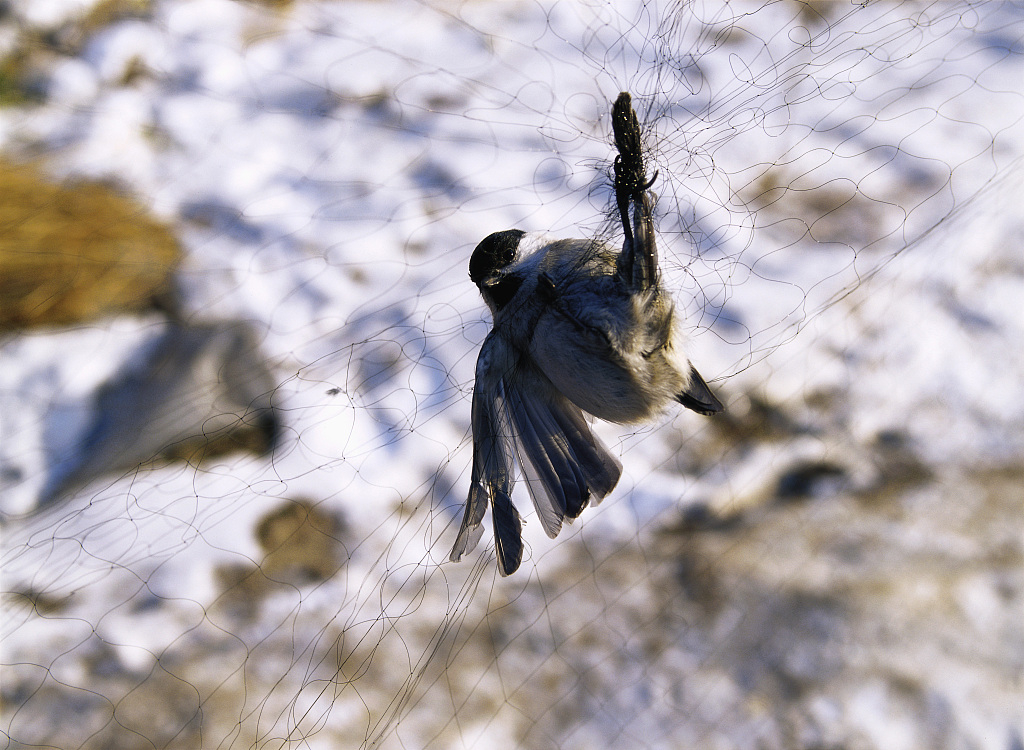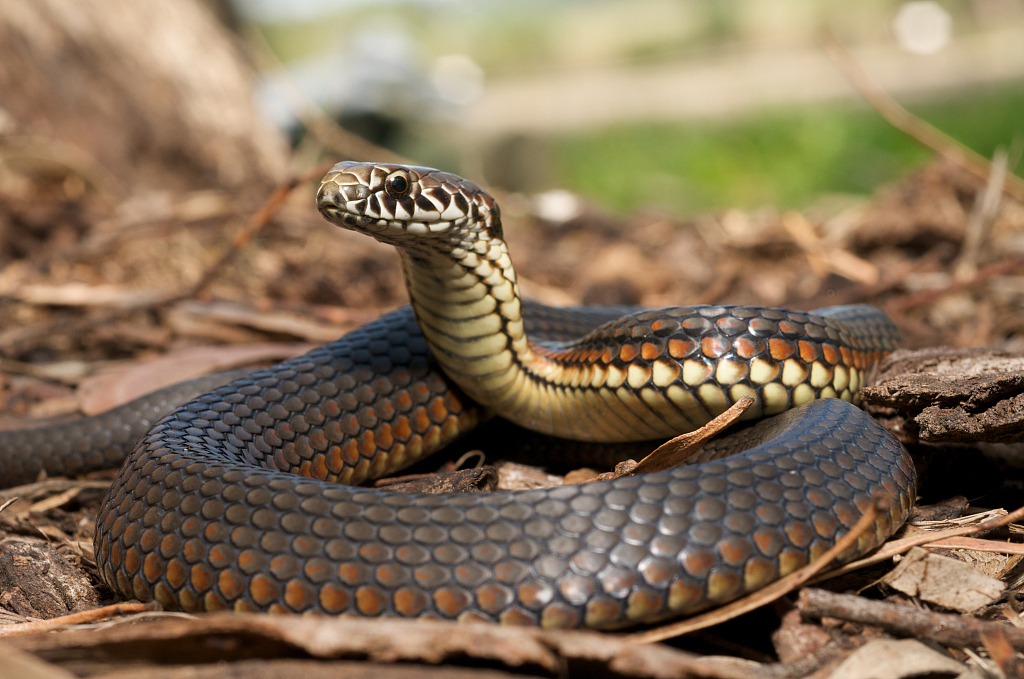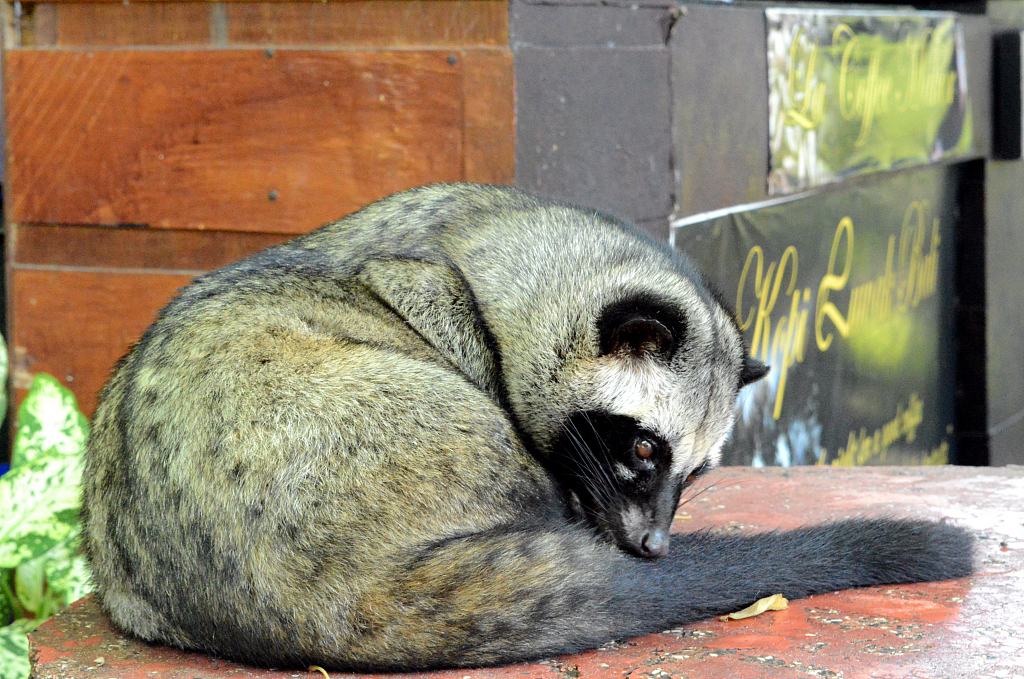In the wake of the novel coronavirus outbreak, China's top legislature has adopted a decision on banning the illegal trading of wildlife and eliminating the consumption of wild animals. The move is an opportunity for the country to rachet up its wildlife conservation system and rethink people's relationship with wildlife.
Zeng Xianlin, a 45-year-old forest ranger, has not taken a day off since late January, despite the coronavirus outbreak.
For nearly two months, Zeng, in Ninghua County of eastern China's Fujian Province, spends hours every day wading through the thick woods hunting for illegal animal-capturing activities.
He discovered six bird-poaching nets during the period.

Forestry departments have been stepping up efforts to dismantle bird nets and crack down on poaching. /VCG Photo
Forestry departments have been stepping up efforts to dismantle bird nets and crack down on poaching. /VCG Photo
In the neighboring county of Mingxi, local forestry police also saved 117 wild animals and arrested four suspects for setting traps and illegal poaching.
Since the outbreak of the novel coronavirus, forestry departments and police across the country have been stepping up efforts in cracking down on illegal wildlife trading as wild animals are the possible intermediate hosts of the deadly virus, which the World Health Organization has just declared as a pandemic.
China suspended illegal trading and the transportation of wild animals shortly after the outbreak. The move became a permanent ban on February 24, when the country's top legislature adopted a decision on thoroughly prohibiting the illegal trading of wildlife and eliminating the consumption of wild animals.
The decision is of far-reaching significance not only in terms of people's dietary habits but also in an economic sense.
According to a report published by the Chinese Academy of Engineering in 2017, over 14 million people participated full-time or part-time in China's wildlife breeding industry in 2016, creating an output value of more than 520 billion yuan (about 74.6 billion U.S. dollars). Among them, there were nearly 6.63 million people employed in the game meat industry, generating an annual output value of 125 billion yuan in 2016.
Now the whole industry will soon be reshuffled.

The breeding industry has been hit hard by the game meat ban. /VCG Photo
The breeding industry has been hit hard by the game meat ban. /VCG Photo
Endangered industry
Breeding wild animals in some remote hilly regions has been encouraged to boost the rural economy. The bamboo rat is one of the star animals in recent years.
Ou Xiaoren, 50, has been raising bamboo rats in Fujian's Youxi County for nearly a decade.
In 2012, he invested 1.8 million yuan in a bamboo rat farm, and the animal has helped him rake in 800,000 yuan in profit every year. In its heyday, the farm kept over 10,000 bamboo rats.
Now his thriving business has been brought to a standstill. He still has 2,000 rats on the farm, which cost him over 1,000 yuan a day.
According to the decision by China's top legislature, wild animals that are not included in the livestock catalog are banned from consumption. The country is still working on a full list of wild animals.
"I'm waiting for the final word every day," he said. "It's like sitting on thorns, and I have no idea what to do now."
Local forestry authorities have asked him to calculate his overall investment for possible compensation.
Some breeders are looking for a way out. Qiu Jinwang, an owner of a snake farm in Fujian's city of Wuyishan, said his company may shift to develop the medical value of the snakes once snake consumption is outlawed.
Yu Shengkui, who raises 1,200 blue peacocks in a village in Minhou County, Fujian, said he is planning to train the peacocks for flying performances as a new way of running the farm for income.

Snake meat is considered a local delicacy in places like southern China's Guangdong Province. /VCG Photo
Snake meat is considered a local delicacy in places like southern China's Guangdong Province. /VCG Photo
Tradition reconsidered
For the majority of Chinese people, especially younger generations, casting off the habit of eating game meat is no big deal.
In fact, the habit of eating wild animals has already been opposed by a growing number of youngsters.
Nearly 97 percent are against wild animal consumption and about 79 percent are against using wildlife products including fur and bones, said an online survey launched by the Peking University Center for Nature Society and other partners from January 28 to February 14, which attracted nearly 100,000 participants.
A 28-year-old resident surnamed Sun in Shenzhen, Guangdong Province, is supportive of the ban despite being a game meat lover himself.
"Aside from the flavor, bushmeat is considered a fine tonic and a symbol of wealth in many places," Sun said. "Wild animals are expensive because they are rare."
Sun recalled that there was a cluster of restaurants serving game meat on Nongyuan Road in downtown Shenzhen several years ago, but they are all gone as China has been strengthening the protection of wild animals over the past decades.
Consuming wild animals does not only exist in China. In some countries, hunting and consuming wild animals is a counter move to the soaring animal population.
The habit of eating game meat in China has been under fire since the novel coronavirus outbreak, and it might become an opportunity for the country to rachet up the wildlife conservation system, reframe people's relationship with wildlife and boost public education.

Civet cat, which is believed to be the intermediate host of SARS virus, is now banned from consumption. But some breeders have found themselves in a very difficult position, even on the verge of bankruptcy. /VCG Photo
Civet cat, which is believed to be the intermediate host of SARS virus, is now banned from consumption. But some breeders have found themselves in a very difficult position, even on the verge of bankruptcy. /VCG Photo
Human-nature harmony
Some farmers have managed to make a living on wild animals without killing or disturbing them.
Yang Meilin, a 77-year-old farmer in Ziyun Village of Mingxi County, walked into the forest at dawn with a bag of corn. After a 10-minute walk, he arrived in a clearing and sprinkled grains on the ground. Soon a flock of birds was attracted with cheerful chirps echoing in the valley.
Located at the source of the Minjiang River, Mingxi County is an important breeding ground for migratory birds. A total of 316 bird species have been found here, attracting thousands of bird watchers from home and abroad every year.
In 2017, the county issued a circular, banning poaching and the trading of all bird species in an effort to strengthen the protection of wildlife.
Yang was among the first to seize the opportunity and invested over 600,000 yuan in rebuilding his cottage into a guest house for bird watchers and shutterbugs.
"People began eating wild birds because they didn't have enough food," Yang said. "Now we can make money from birdwatching tours. Why should we hurt them?"
For more:
Shenzhen, a mirror in China's campaign against game meat consumption
COVID-19, wildlife trade ban double slap for rat farmers
Bullfrogs and soft-shelled turtles back on the menu
Experts weigh in on possible ban of all wildlife trade and consumption
(All images via VCG)
(If you want to contribute and have specific expertise, please contact us at nature@cgtn.com.)
Source(s): Xinhua News Agency